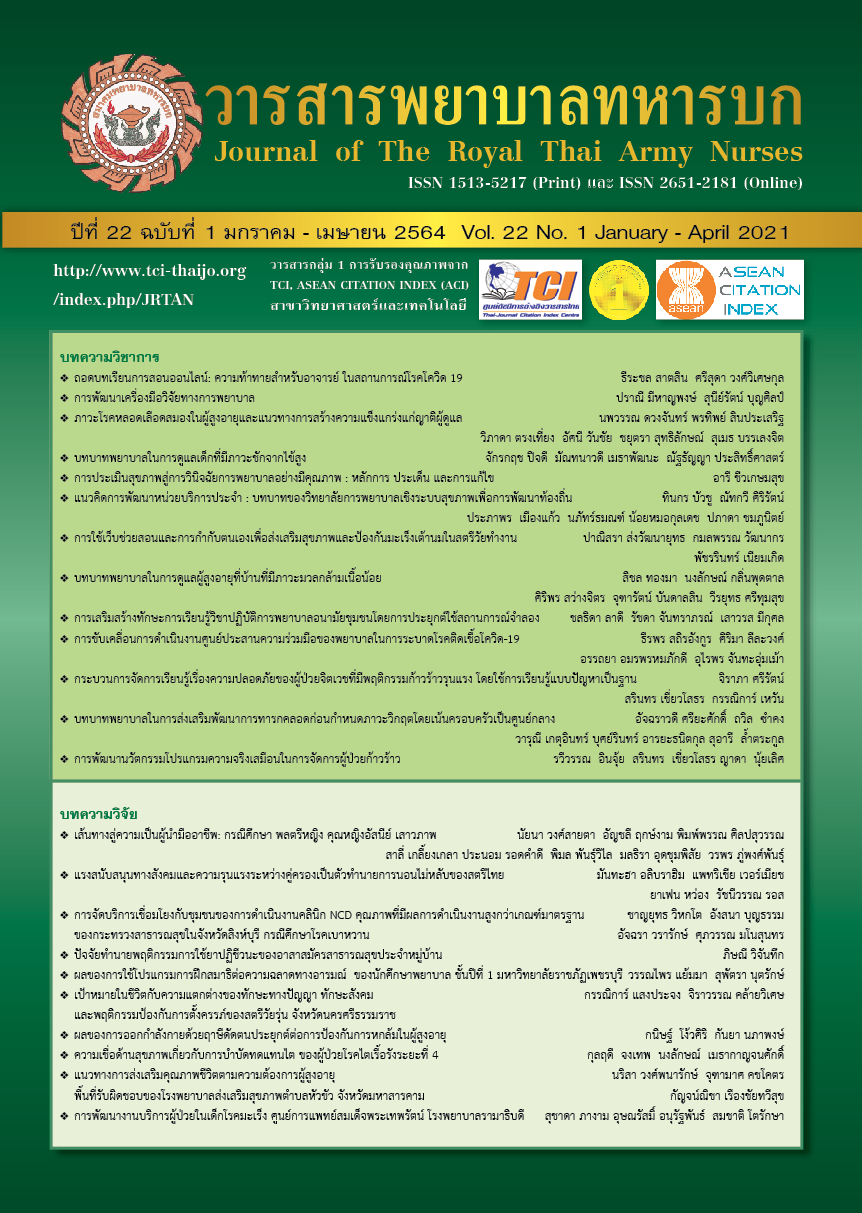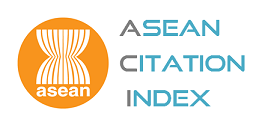ผลของโปรแกรมการระลึกถึงความหลังต่อความเข้มแข็งทางใจในผู้สูงอายุที่มีภาวะซึมเศร้า
คำสำคัญ:
โปรแกรมการระลึกถึงความหลัง, ความเข้มแข็งทางใจ, ผู้สูงอายุที่มีภาวะซึมเศร้า, การดูแลตามปกติบทคัดย่อ
การวิจัยนี้มีวัตถุประสงค์ เพื่อศึกษาผลของโปรแกรมการระลึกถึงความหลังต่อความเข้มแข็งทางใจในผู้สูงอายุที่มีภาวะ ซึมเศร้า เป็นวิจัยกึ่งทดลอง วัดผลก่อนและหลังการทดลอง แบบมีกลุ่มควบคุม กลุ่มตัวอย่าง คือ ผู้สูงอายุที่มีภาวะซึมเศร้าที่มารับ บริการโรงพยาบาลส่งเสริมสุขภาพตำบล 2 แห่ง จำนวน 60 คน โดยสุ่มอย่างง่ายเข้ากลุ่มทดลองและกลุ่มควบคุมกลุ่มละ 30 คน กลุ่มทดลองได้รับโปรแกรมการระลึกถึงความหลังแบบจัดการกับปัญหาที่พัฒนามาจากแนวคิดการระลึกถึงความหลังประสบการณ์ ในอดีตและการจัดการกับปัญหา จำนวน 6 ครั้ง ครั้งละ 60 นาที จำนวน 2 ครั้งต่อสัปดาห์ ติดต่อกัน 3 สัปดาห์ ซึ่งโปรแกรมได้ผ่าน การตรวจสอบความตรงเชิงเนื้อหา โดยผ่านผู้ทรงคุณวุฒิ 3 ท่าน และกลุ่มควบคุมได้รับการดูแลตามปกติ เครื่องมือที่ใช้ในการเก็บ รวบรวมข้อมูล คือ 1) ข้อมูลส่วนบุคคล 2) แบบประเมินความเข้มแข็งทางใจ ซึ่งผ่านการตรวจสอบความเชื่อมั่นสัมประสิทธิอัลฟา ของคอนบาคเท่ากับ .89 วิเคราะห์ข้อมูลด้วยสถิติเชิงพรรณนา และสถิติทดสอบที (t-test)
ผลการวิจัยพบว่า 1) ค่าเฉลี่ยคะแนนความเข้มแข็งทางใจของผู้สูงอายุที่มีภาวะซึมเศร้า ในกลุ่มทดลอง (M = 90.90, SD = 6.42) สูงกว่าก่อนได้รับโปรแกรมการระลึกถึงความหลัง (M = 61.23, SD = 6.41) อย่างมีนัยสำคัญทางสถิติ (t = 9.12, p<.001) และ 2) ผลต่างของค่าเฉลี่ยคะแนนความเข้มแข็งทางใจในผู้สูงอายุที่มีภาวะซึมเศร้าของกลุ่มทดลอง ( = 29.66, SD = 8.90) สูงกว่ากลุ่มควบคุม (
= 9.70, SD = 10.73) อย่างมีนัยสำคัญทางสถิติ (t = 7.8, p<.001)
Downloads
เอกสารอ้างอิง
Jintana A. Modality of care for the older adults in community. J Royal Thai Army Nurses. 2014; 15(3): 123-127. (in Thai)
United nations, Department of economic and social affairs. World population ageing 2017. New York: United Nation; 2017.
World Health Organization. World report on ageing and health. Switzerland: WHO Press; 2015.
Foundation of Thai Gerontology Research and Development institute. Situation of the Thai elderly 2017. Bangkok: TGRI; 2017. (in Thai)
Wongsuraprakit S, Santiprasitkul S. Situation of depression in pre-screened risk groups in Muang district, Chiang Rai Province. Thai Journal of Nursing Council. 2012; 27(3): 91-105. (in Thai)
Aekponlakarn W, Report of the public health survey of Thai by the 5th physical examination 2014. Nonthaburi: Health system research institute; 2014. (in Thai) 7. Peeyapong P. Depression let’s talk. Nonthaburi: Department of mental health; 2017. (in Thai)
Muijeen K. Determinants of mental health among aging. Thai Sci Technol J. 2015; 23(2): 306–18. (in Thai)
Kaewsasri A, Nilliaum R, Heetaksorn C. Changes in Thai society and culture and trends of nursing profession. Songklanagarin J Nurs. 2017; 37(3): 160–9. (in Thai)
Wongpanarak N, Chaleoykitti S. Depression: A significant mental health problem of elderly. J Royal Thai Army Nurses. 2014; 15(3): 24-31. (in Thai)
Lueboonthavatchai O. The mental health and psychiatric nursing. 2nd edition. Bangkok: V-Print; 2011. (in Thai)
Leeman J, Skelly A.H, Burn D, Carlson J, Soward A. Tailoling a diabetes self-care intervention for use with older, rural African American women. The Diabetes Educator. 2008; 34(2): 310-17.
Macleod S, Musich S, Hawkins K, Alsgaard K, Wicker E.R. The impact of resilience among older adults. Geriatric Nursing. 2016; 37(4): 266-272.
Boonbunjob O, Dangdomyouth P. The effect of family-involved resilience promoting program on depression in older persons with major depressive dissorder. Journal of Nursing Science Chulalongkorn University. 2018; 30(2): 110-123. (in Thai)
Randall W. The importance of being ironic: Narrative openness and personal resilience in later life. The Gerontologist. 2013; 53(1): 9-16.
Haight B, Gibson F. Burnside’s working with older adults: group process and technique. 4th edition. Massachusetts: Jones and Bartlett Publishers; 2005.
Wong P.T, Watt L.M. What types of reminiscence are associated with successful aging? Psychology and Aging. 1991; 6(2): 272-9.
Lieberman M.A, Tobin S.S. The experience of old age: stress, coping, and survival. New York: Basic Book; 1983.
Cappeliez P, Guindon M, Robitaille A. Function of reminiscence and emotional regulation among older adult. Journal of Aging Studies. 2008; 22(3): 266-272.
Erickson E.H. Insight and responsibility: lectures on the ethical implication of psychoanalytic insight. 2nd edition. New York: W. W. Norton & Co; 1964.
Connor K.M, Davidson J.R. Development of a new resilience scale: The Connor-Davidson resilience scale (CD-RISC). Depression and Anxiety. 2003; 18(2): 76-82.
Cohen J. Statistical Power Analysis. SAGE Journal. 1992; 1(3): 98-101.
Grove S.K, Burns N, Gray J.R. The practice of nursing research. 7th edition. Missouri: Elsevier; 2013.
Khongphaisansophon A. Soonthornchaiya R. Factors related to resilience among older persons with major depressive disorder. The Journal of Psychiatric Nursing and Mental Health. 2016; 30(2): 127-142. (in Thai)
Wongpakaran N. Geriatric psychiatry in Thailand. J Psychiatr Assoc Thailand. 2008; 53(s): 39s-46s. (in Thai)
Puangwarin N. Stroke. 2nd edition. Bangkok: Ruenkeaw Karnpim; 2001. (in Thai)
Kanjananopinit S, Charoensak S, Keawpornsawan T. The study of psychometric properties of cognistat Thai version. J Psychiatr Assoc Thailand. 2014; 59(4): 409-418. (in Thai)
Phadungyam M, C. Duvall A. Rehabilitation strategies for resilience quotient in the elderly. J Royal Thai Army Nurses. 2018; 19(1): 66-73. (in Thai)
ดาวน์โหลด
เผยแพร่แล้ว
รูปแบบการอ้างอิง
ฉบับ
ประเภทบทความ
สัญญาอนุญาต
บทความหรือข้อคิดเห็นใดใดที่ปรากฏในวารสารพยาบาลทหารบกเป็นวรรณกรรมของผู้เขียน ซึ่งบรรณาธิการหรือสมาคมพยาบาลทหารบก ไม่จำเป็นต้องเห็นด้วย
บทความที่ได้รับการตีพิมพ์เป็นลิขสิทธิ์ของวารสารพยาบาลทหารบก
The ideas and opinions expressed in the Journal of The Royal Thai Army Nurses are those of the authors and not necessarily those
of the editor or Royal Thai Army Nurses Association.







